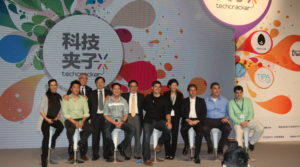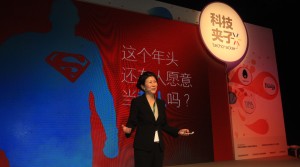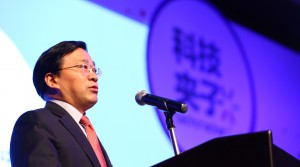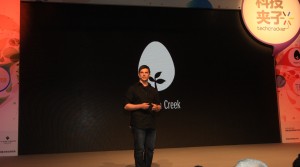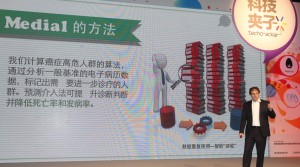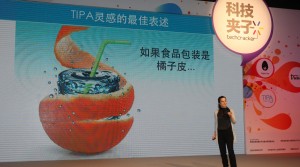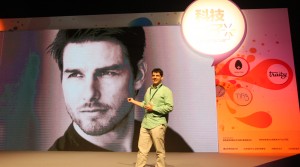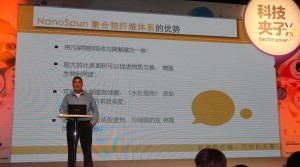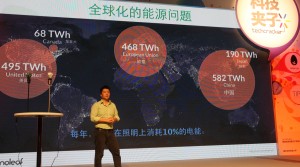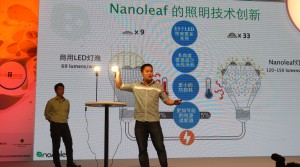The “2014 Techcracker” China roadshow kicked off in Beijing on May 19th. Jointly organized by the Science Research Information Technology Co., Ltd,—a subsidiary of the Development Research Center of the State Council (DRC)—China Economic Yearbook and the Li Ka Shing Foundation, the event covers Xian, Suzhou, Zhengzhou, Jinan and Guangzhou from May 19th to 23rd. It is also supported by the Sun Ye Fang Foundation and Cheung Kong Graduate School of Business, and the Guangdong People’s Government of Foreign Affairs in Guangzhou. The event showcases some of the most innovative technology companies in the world, who share a common desire to take part in the vital conversation on sustainable economic growth in China.
Han Jun, Deputy Director of the DRC emphasised, “Innovation has always been the cornerstone and the most efficient mean of national prosperity and growth. History shows that where there is innovation, economic growth follows. President Xi Jinping repeatedly urged the importance of implementing innovative strategies and encouraging personal growth. Over the years, Mr. Li Ka-shing and the Li Ka Shing Foundation have extended a helping hand across the world; his mission to improve education and healthcare in particular is unwavering over the years. We believe that the success of this event will greatly promote scientific and technological achievements and catalyse far-reaching influence at home and abroad.”
In his written opening remark, Mr. Li Ka-shing said, “We need to embrace novelty and change if we want to lead the way forward into the future. Companies need to fuse innovation and technology into its DNA and governments need to rid themselves of archaic straitjackets and shackles that weigh them down.
An exciting movement of redefinition, reinvention, re-imagination and re- contextualisation is happening, living and absorbing all this could be so much fun, and the sheer thrill of witnessing the limitless possibilities of technology is simply mesmerising.”
The seven companies selected by the Li Ka Shing Foundation are from United States, Canada, Israel and Spain, and are some of the world’s most revolutionary, environmentally responsible and sustainable technologies. On the one hand, the event aims to introduce new mechanisms of research and development in China. And on the other, the event allows for both the startups and local companies to explore cooperating opportunities.
In a technological revolution, the global economy and relationship between entities and people are changing. The Chinese economy has the ability to seize this opportunity to improve technological innovation for economic and social development. China needs to accelerate technological innovation by leaps and bounds, and this requires a more open platform through international exchanges and cooperation with leading technologies across the world.
National Research Information Technology Co., Ltd.—an entity of the State Council Development Research Center—specialises in information technology services; China Economic Yearbook is an important platform for the Development Research Center under the State Council think tank, which disseminates ideas and latest developments in science and technology; the Li Ka Shing Foundation seeks to inspire societal improvement through supporting education and healthcare initiatives, and is committed to encouraging technology as a channel to the future.
With the goal of promoting and catalysing industrial and technological growth in China, Josh Tetrick (Founder and CEO, Hampton Creek), Doran Gal (CEO , Kaiima), Daphna Nissenbaum (Founder & CEO, TIPA Corp), Ori Geva Halbersberg (Founder & CEO, Medical Cancer Screening), Juan Cartagena (Founder and CEO, Traity), Ohad Ben Dror (CEO, Nanospun), Christian Yan and Gimmy Chu (Co-founders, Nanoleaf Technologies) travel across the country to introduce their revolutionary technologies to our Chinese audiences.
Hampton Creek is a foods company that is committed to bringing healthy and affordable food to everyone, everywhere. Their unique technology platform enables the production of healthier food at a lower cost, starting with the safe and sustainable option for the conventional egg. By researching and mixing various plants, Hampton Creek makes eggless foods that are free of cholesterol, more ecologically sustainable and humane, and moreover, cheaper than their egg counterparts.
Medial Cancer Screening revolutionises the healthcare field in algorithmic analysis of medical data. Through algorithmic analyses of medical data and a series of low-cost basic blood tests, MCS is able to rapidly screen and deduce personal cancer risk evaluations. Revolutionising healthcare, MCS’s technology detects high-risk individuals at a cost-efficient and simple method, allowing patients to receive faster treatments and reduce morbidity.
Kaiima’s non-GMO technology, called Enhanced Ploidy, increases the amount of DNA in the cell nucleus of plants (wheat, rice, corn, castor etc.). By copying and accelerating what nature does in evolution, Kaiima is creating bigger and stronger plants to feed the world. By increasing efficiency starting from the seeds, Kaiima’s technology also elevates land and water efficiency.
The Nanoleaf bulb is the world’s most energy efficient light bulb. Made from PCB (printed circuit board), the bulb is convenient and shatter resistant. With its unique shape, the Nanoleaf emits an omnidirectional light that not many other LED manufacturers are able to produce. Achieving an impressive 150 lumens per watt (measure of efficiency), it uses 12 watts of energy to emit light of 100 watts; it also lasts 27 years.
Tipa’s revolutionary multi-layered film brings a whole new breed of sustainable flexible packaging to the market. In the right conditions, Tipa’s flexible food packaging is able to biodegrade in just 180 days. Characterised by flexibility, transparency, high yield strength, impact strength and barrier properties, Tipa is able to customise packaging from water, chips to granola bars.
Traity emerges as a standard for reputation, so that in today’s global economy and increasingly Internet centric market, consumers and companies alike can trust each other with more transparency. Using unbiased algorithmic analyses, big data collected deduces reliable reference charts and “scientifically calculated personalities”, enhancing transparency and trust in market research, human resources and competitiveness.
From May 20 to 23rd, “2014 Techcracker” companies covered the cities of Xi’an, Suzhou, Zhengzhou, Jinan and Guangzhou. These seven startups span fields of agriculture, energy, biotechnology, environmental management, health care and big data, and are all of importance to furthering growth in China.

